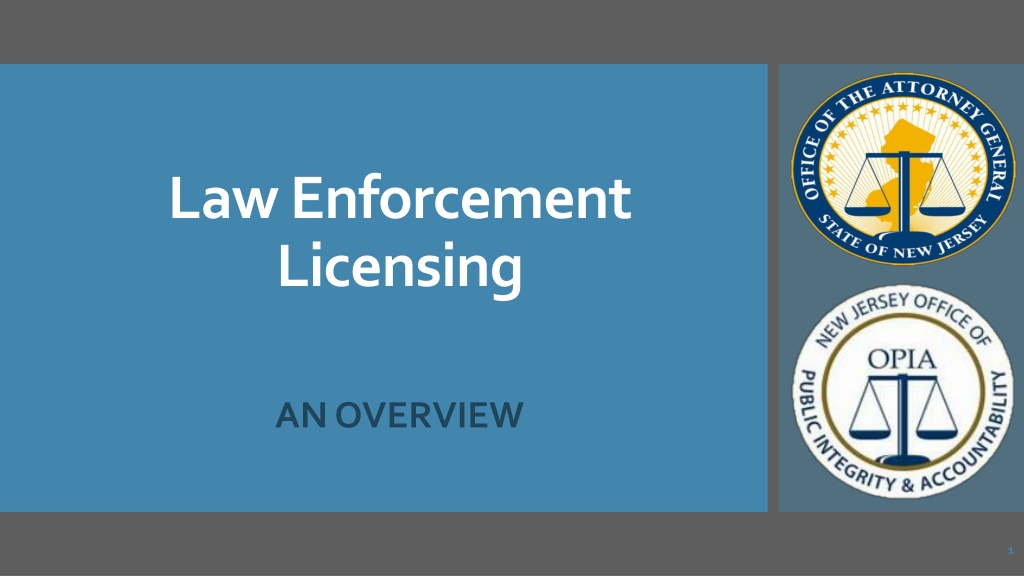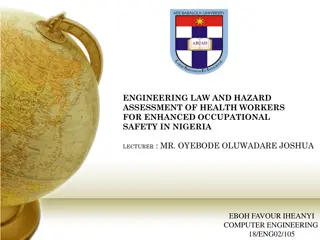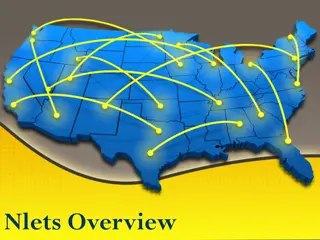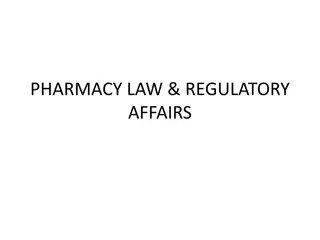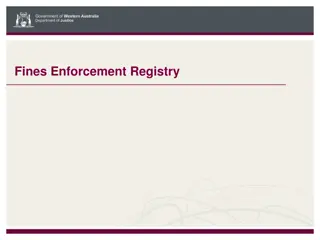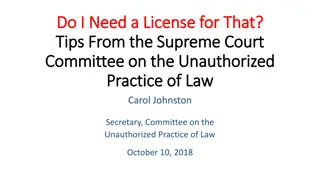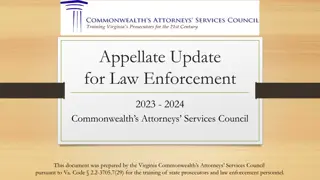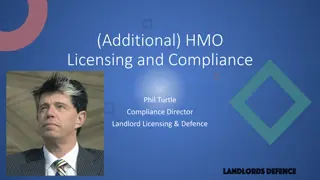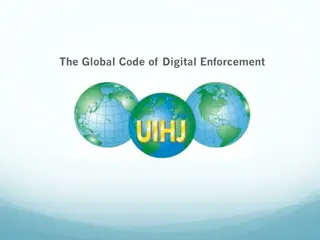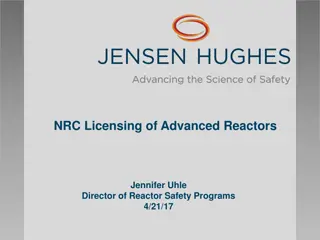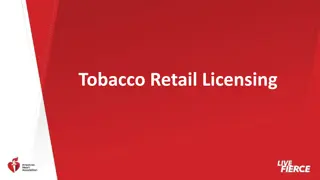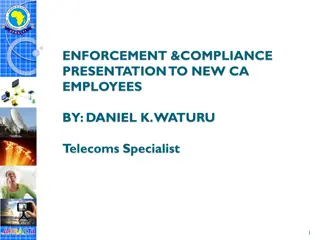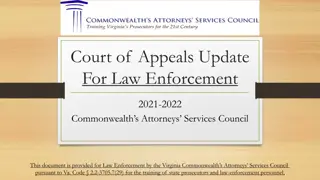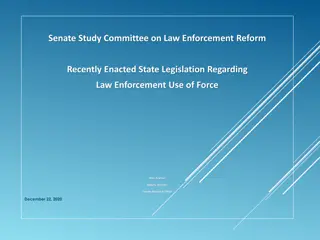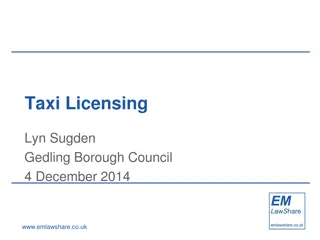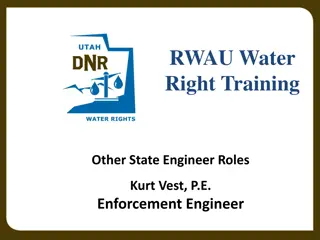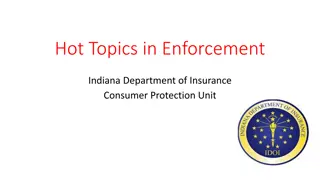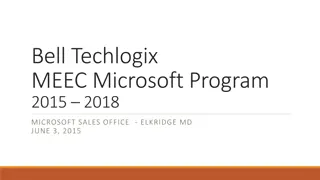Law Enforcement Licensing: An Overview
This overview delves into the new legislation mandating licensure for all sworn law enforcement officers in New Jersey, outlining the rationale, effective dates, and implications for officers. The Police Training Commission (PTC) administers licensing, ensuring professionalism and accountability within the law enforcement sector.
Download Presentation

Please find below an Image/Link to download the presentation.
The content on the website is provided AS IS for your information and personal use only. It may not be sold, licensed, or shared on other websites without obtaining consent from the author.If you encounter any issues during the download, it is possible that the publisher has removed the file from their server.
You are allowed to download the files provided on this website for personal or commercial use, subject to the condition that they are used lawfully. All files are the property of their respective owners.
The content on the website is provided AS IS for your information and personal use only. It may not be sold, licensed, or shared on other websites without obtaining consent from the author.
E N D
Presentation Transcript
Law Enforcement Licensing AN OVERVIEW 1
SECTION I: INTRODUCTION 2
The bill was signed into law on July 21, 2022, and with a few exceptions, the law and the regulations take effect on January 1, 2024. The legislature found Licensure necessary for all sworn law enforcement officers in order to maintain professionalism and uphold public trust in law enforcement. This means any person who is employed as a sworn member of any State, county or municipal law enforcement agency, department, division, or instrumentality of those governments who is statutorily empowered to act for the detection, investigation, arrest, conviction, detention or rehabilitation of persons violating the criminal laws of the State needs a license effective January 1, 2024. Why Police Licensure? When does it take effect? Who Does it Effect? N.J.S.A. 52:17B-67.1 N.J.A.C. 13: 1-10.1 N.J.S.A. 52: 17B-1, et. Seq. N.J.S.A. 52:17B-66 N.J.A.C. 13:1-2.1 N.J.A.C. 13:1-21.1 3
A License is valid for 3 years from the date of issue. HOW LONG DOES A LICENSE LAST? All currently certified officers will receive a license on January 1, 2024. The initial licensing period will stagger expiration dates in a manner determined by the PTC. These licenses will be for 1, 2, or 3 years. Initial licensing period shall not exceed 3 years. N.J.S.A. 52: 17B- 1, et. Seq. The PTC will issue guidance for subsequent licensing intervals so that all of the approximately 38,000 law enforcement officers will not have to be renewed at the same time. N.J.A.C. 13:1- 20.1 4
The Police Training Commission Originally created by the Police Training Act to facilitate education and training of LEOs Who Administers Licensing? N.J.S.A. 52:17B- 71 The PTC s goal is to enhance professionalism, transparency, and accountability of law enforcement Composed of representatives of various organizations The AG is the Chairperson Appoints an administrator 4 citizens of N.J. who are appointed by the Governor with the advice and consent of the state Senate. Their terms are for three years. 16 Other members include the PBA, FOP, NJSACOP, The NJSP, and the STFA. N.J.A.C. 13:1-2.5 Powers, Responsibilities, and duties now include, but are not limited to, administering law enforcement licensing and regulating all aspects of law enforcement training. N.J.A.C. 13:1-2.6
Do members of the PTC have to undergo training? N.J.S.A. 52:17B-71 All members of the PTC must annually complete all training mandated by the Attorney General, including but not limited to, ethics and confidentiality training. N.J.A.C. 13:1- 2.4 All newly appointed public members of the PTC must complete a course familiarizing themwith relevant law enforcement training concepts, including but not limited to, use of force and internal affairs policy. 6
What is the Licensing Committee? N.J.S.A. 52:17B- 70 The Licensing Committee administers licensing Has at least seven members including AG and at least one public member; Can review applications for licensing; Request additional information to determine qualifications; Make recommendations for adverse licensing action; and May designate a hearing officer to conduct hearings N.J.S.A. 52:17B- 71 N.J.A.C. 13:1-2.2 N.J.A.C. 13:1-2.6
SECTION II: LICENSE REQUIREMENTS 8
The Appointing Authority makes the LEO appointment; Who Notifies PTC of a New Appointments? The Chief Law Enforcement Executive of an employing Law Enforcement Unit shall notify the PTC in writing of a LEO s appointment to or employment with the LEO Unit. NONA form will be absorbed into ACADIS N.J.S.A. 52: 17B-77.16(a) The LEO Unit is responsible for collecting, verifying, and maintaining all required licensing documentation Completed application records must be maintained for at least 5 years Ultimately, the Chief LEO Executive s responsibility N.J.S.A. 52: 17B-71c N.J.A.C. 13: 1-11.2 Notification shall include the commencement date of such appointment or employment. N.J.A.C. 13: 1-11.3 9
The amount of written notice that the Chief LEO Executive must provide the school director prior to the course beginning that LEO Unit has complied with its responsibilities pursuant to N.J.A.C. 13:1-8.1, et. seq. has increased from 10 days to 21 days. If LEO Unit cannot comply, LEO Unit may make a written request to the Commission for an extension of time. Notification must be sent to School Director for New Hire Trainees N.J.S.A. 52: 17B-77.16a N.J.S.A. 52: 17B-71c The extension request must state the reasons why an extension of time is needed. N.J.A.C. 13:1-8.2 Important to schedule hiring around beginning of academy class 10
License Requirements: Screening Applicants In order to be licensed, the Applicant must satisfy the basic licensing requirements. LEOs appointed on or after 1/1/24 must complete the initial licensing process. LEOs appointed prior to 1/1/24 must complete the license renewal process. N.J.S.A. 52: 17B-67.1 N.J.S.A. 52: 17B-71b N.J.S.A. 52: 17B-71c If the Applicant does not satisfy the basic licensing requirements, they cannot be licensed. BACKGROUND IS IMPORTANT N.J.S.A. 52: 17B-71d N.J.A.C. 13: 1-10.2 N.J.A.C. 13: 1-11.2 11
A license application may be denied if the applicant fails to meet any of the license requirements such as: License Requirements: Screening Applicants 1) 18 or older 5) US Citizen ( if required) 9) H.S. or G.E.D. 13) Valid D.L. N.J.S.A. 52: 17B-71b 2) No Dishonorable Discharge 6) Fingerprinted to PTC Standards 10) Pass PTC authorized background check 14) Pass a Medical Exam N.J.S.A. 52: 17B-71c 3) Pass a drug test 7) Pass a psychological exam 11) Pass a physical ability test. No PT test for renewals. 15) Not on inactive status (renewal only) N.J.S.A. 52: 17B-71d 4) Certify they have not engaged in any conduct or been the subject of any action which would provide grounds to refuse to renew the LEO s license (renewal only) 8) Certify they continue to meet the eligibility standards to serve (renewal only) 12) meet and complete all PTC required basic physical education requirements and 16) successfully complete any PTC prescribed probationary period. N.J.A.C. 13: 1-10.2 N.J.A.C. 13: 1-10.3 N.J.A.C. 13: 1-11.2 12
1) The National Decertification Index. Applicant cannot have had any adverse action or revocation of a law enforcement license; 5) PTC records, including adverse licensing actions; WHAT THE BACKGROUND CHECK MUST INCLUDE: 2) disciplinary records held by any other LEO Unit including the Feds and other states (if permissible); 6) all employment related information from each of the applicant s current and previous employers and any records that may be held by LEO units that rejected an applicants completed application N.J.S.A. 52: 17B-71c 3) Written communication with each of the applicant s references. If the applicant previously worked as a LEO, a written reference from each LEO Unit the applicant worked for that addresses if the former employer is aware of any of the applicant s conduct that would provide the basis for an adverse licensing action, including conduct that was investigated even if the investigation was not completed. 7) Motor vehicle history in NJ and any other state N.J.S.A. 52: 17B-71d N.J.A.C. 13: 1-10.3 . N.J.A.C. 13: 1-11.2 4) Educational background, including transcripts and disciplinary records going back to high school 8) Military Service (cannot have received a dishonorable discharge) 13
The BACKGROUND CHECK includes: FINGERPRINTING of the Applicant NJSP, FBI, and other relevant databases NCIC Interstate Identification Index NJDMV History, and if necessary any DMV from surrounding states E-Courts, ATS, and ACS Promis Gavel A check in accordance with the Prison Rape Elimination Act The Domestic Violence Registry Any other database or successor database to the above named sources WHAT THE BACKGROUND CHECK MUST INCLUDE: N.J.S.A. 52: 17B-71c N.J.S.A. 52: 17B-71d N.J.A.C. 13: 1-10.3 N.J.A.C. 13: 1-11.2 Primary purpose is to check for warrants, arrests, restraining orders, or criminal records 14
The BACKGROUND CHECK includes a SOCIAL MEDIA CHECK of the Initial Applicant s SOCIAL MEDIA that searches: Initial Applicant must provide access to all social media accounts; The initial applicant must list every social media account they used within the past 5 years, regardless of whether or not the account has been deleted or is no longer used At a minimum, must search outwardly facing and publicly accessible components of those accounts The search is for content relevant to bias-relevant behaviors; behaviors indicative of misconduct or dishonest, illegal acts or activity; or other behaviors or evidence indicative of unsuitability or ineligibility for law enforcement licensure ---Includes group membership in any hate group or group advocating the overthrow of the government Applicant must certify they do not belong to such a group WHAT THE BACKGROUND CHECK MUST INCLUDE: N.J.S.A. 52: 17B-71c N.J.S.A. 52: 17B-71d N.J.A.C. 13: 1-10.3(a)(6) N.J.A.C. 13: 1-11.2 The LEO Unit may access a Renewal Applicant s social media only if they have a reasonable articulable belief the Renewal Applicant used their social media account for reasons that are violative of the act or the rules. Otherwise, only search the outwardly facing or publicly accessible components of the renewal applicant s social media accounts. 15
Medical Exam must be conducted by a: NJ licensed Physician; NJ Licensed advance practice nurse; or NJ Licensed nurse assistant; Look for conditions that may potential exclude from basic course What are the minimum requirements for the medical exam? Medical Exam must include: a comprehensive medical history questionnaire completed by the Applicant; the Applicant s medical history; a medical examination of the applicant; a complete blood count, urinalysis, tuberculosis, electrocardiogram; N.J.S.A. 52: 17B-71c The Applicant may seek a second opinion if the medical exam indicates the Applicant has medical or physical conditions which may interfere with their ability to perform the essential functions of a LEO; However, unlike the initial exam, the Applicant must pay for the second opinion. The PTC may consider the second opinion, but is not bound by any findings in a second opinion. Medical History Statement and Medical Exam Report are valid 1 year from the date the examiner signs them. N.J.S.A. 52: 17B-71d N.J.A.C. 13: 1-10.4 N.J.A.C. 13: 1-11.2 16
What are the minimum requirements for the Drug Test? Applicant must pass the drug test. Must be conducted consistent with current applicable AG Law Enforcement Drug Testing Policy. Time drug test with the start of the academy so that all required documentation can be timely submitted to PTC. N.J.S.A. 52: 17B-71c N.J.S.A. 52: 17B-71d N.J.A.C. 13: 1-10.5 N.J.A.C. 13: 1-11.2 17
In order to be eligible for a LEO license the Applicant must pass the psychological exam; Employing LEO Unit shall arrange for psychological exam that is conducted no more than 12 months prior to academy orientation day or application for permanent employment; What are the minimum requirements for the Psychological Exam? Must be conducted by a NJ licensed psychiatrist or psychologist who uses a PTC prescribed form relevant to the duties of the title the applicant is appointed to; N.J.S.A. 52: 17B-71c N.J.S.A. 52: 17B-71d Psychiatrist or psychologist conducting exam must be familiar with the responsibilities of a law enforcement officer and use a written personality test such as: NEO-PI-R Inwald Personality Inventory Any other exam that is their functional equivalent N.J.A.C. 13: 1-10.6 N.J.A.C. 13: 1-11.2 18
Applicants must pass all 5 components of the Pre- Admission PT Test: What are the minimum standards for the physical ability test? A vertical jump of 15 inches or more; 1-2 min recovery 28 sit-ups in one minute or less, verbally counted by instructor as one complete, etc.. ; 5 min recovery 300 meter run in 70.1 seconds or less; 10 min recovery 24 push-ups in one minute or less verbally counted by instructor as one complete, etc. ; 5 min recovery A 1.5 mile run in 15 min and 55 seconds or less; 5 min recovery N.J.S.A. 52: 17B-71c N.J.S.A. 52: 17B-71d N.J.A.C. 13: 1-10.7 N.J.A.C. 13: 1-11.2 Applicants should be provided at least 3 minutes to warm up. The Test should be conducted within one continuous 8 hour period on a level surface, level track, or other PTC approved surface 19
If an applicant fails the initial fitness requirement, the Chief LEO shall schedule a retest date at the request of the Applicant; When practicable, the retest date should be no less than 3 weeks after the initial failed test; During a re-test, the applicant must take the entire test over. The applicant must pass the entire re-test. The applicant cannot count previous passing results toward any retest. What are the minimum standards for the physical ability test? N.J.S.A. 52: 17B-71c N.J.S.A. 52: 17B-71d N.J.A.C. 13: 1-10.7 N.J.A.C. 13: 1-11.2 20
License Requirements: Screening Applicants PTC is mandated to deny a license or take adverse action if there is a preponderance of the evidence that the Applicant: N.J.S.A. 52: 17B-71b Has a criminal conviction. This means ANYTHING regarded as a criminal offense in any other jurisdiction, foreign or domestic. N.J.S.A. 52: 17B-71c Has a domestic violence conviction. N.J.S.A. 2C:25-17. This means ANYTHING considered a domestic violence offense in any other jurisdiction, foreign or domestic. N.J.S.A. 52: 17B-71d Is the subject of or had a DV restraining order, an extreme risk protection order, or temporary extreme risk protection orderentered against them; N.J.A.C. 13: 1-10.2 Has a conviction that would preclude them from carrying a firearm as defined in N.J.S.A. 2C:39-1. Includes any offense of this nature that violates the laws of any other jurisdiction, foreign or domestic. N.J.A.C. 13: 1-11.2 N.J.A.C. 13: 1-11.5 N.J.A.C. 13: 1-12.1 21
License Requirements: Screening Applicants In order to be licensed Initial or Renewal Applicant must: Not have any disorderly persons or petty disorderly persons convictions involving dishonesty, fraud, or lack of good moral character; Unless the PTC determines the offense to be de-minimis or inconsequential to applicant s ability to meet the standards expected for a LEO; This also includes similar offenses in any other jurisdiction N.J.S.A. 52: 17B-71b N.J.S.A. 52: 17B-71c Not have 2 or more motor vehicle convictions for DWI pursuant to N.J.S.A. 39:4-50. This includes similar offenses in any other jurisdiction; N.J.S.A. 52: 17B-71d Not have 2 or more motor vehicle convictions for reckless driving pursuant to N.J.S.A. 39:4-96. This includes similar offenses in any other jurisdiction; N.J.A.C. 13: 1-10.2 N.J.A.C. 13: 1-11.2 N.J.A.C. 13: 1-11.5 N.J.A.C. 13: 1-12.1 PTC may take adverse action or denial if there is a preponderance of evidence of any of the above. 22
License Requirements: Screening Applicants All License Applicants cannot: N.J.S.A. 52: 17B-71b Be an active member of a group or organization that advocates, espouses, or promotes the overthrow of: N.J.S.A. 52: 17B-71c N.J.S.A. 52: 17B-71d A local government A state government The federal government N.J.A.C. 13: 1-10.2 N.J.A.C. 13: 1-11.2 23
License Requirements: Screening Applicants In order to be licensed the Initial and Renewal Applicant: N.J.S.A. 52: 17B-71b Cannot be a member of a street gang or security threat group . A security threat group is any group that possesses common characteristics, interests, and goals which as a discrete entity, pose a threat to the safety of the community or public at large N.J.S.A. 52: 17B-71c N.J.S.A. 52: 17B-71d N.J.A.C. 13: 1-10.2 N.J.A.C. 13: 1-11.2 24
In order to be licensed the Initial and Renewal Applicant must: License Requirements: Screening Applicants Not be an active member of a group or organization that advocates for violence against or hatred or bias toward individuals based on: N.J.S.A. 52: 17B-71b Race Ancestry Sexual Orientation Creed Age Gender Identity or Expression N.J.S.A. 52: 17B-71c Color Sex Any other protected characteristic under the law against discrimination N.J.S.A. 52: 17B-71d National Origin Marital Status N.J.A.C. 13: 1-10.2 Likewise, cannot have engaged in conduct or behavior in their personal or professional life, that demonstrates, espouses, advocates, or supports discrimination, violence against, hatred or bias toward these groups N.J.A.C. 13: 1-11.2 25
License Requirements: Screening Applicants Examples of prohibited Applicant conduct includes but is not limited to: Making statements; Posting; Sharing; or Commenting in support of any posting social media or otherwise N.J.S.A. 52: 17B-71b N.J.S.A. 52: 17B-71c N.J.S.A. 52: 17B-71d The test is whether or not the conduct: Would undermine public confidence in the LEO; or The LEO Unit s ability to carry out the public safety mission; or The conduct or behavior would cause substantial disruption to proper law enforcement functioning. N.J.A.C. 13: 1-10.2 N.J.A.C. 13: 1-11.2 26
1) Have not submitted any false, untrue or misleading statements on their license application or any communication made in connection with their license application 6) Have no sustained finding that they knowingly engaged in any fraudulent or deceptive conduct License Requirements: Screening Applicants 2) Have no sustained finding that they filed a false report 7) Have no sustained finding that they submitted a false certification N.J.S.A. 52: 17B-71b 3) Have no sustained finding they testified falsely in any criminal, administrative, employment, financial, or insurance matter in their personal or professional life 8) Have no sustained finding that they intentionally mishandled, destroyed, or fabricated evidence N.J.S.A. 52: 17B-71c N.J.S.A. 52: 17B-71d 4) Have no sustained finding they engaged in conduct that compromised the validity of testing 9) Have no sustained finding they intentionally made any false statement in obtaining a LEO license N.J.A.C. 13: 1-10.2 5) Have no sustained finding they failed to cooperate with an investigation or respond truthfully to questions related to an investigation or legal proceeding 10) Have no sustained finding they refused to submit to a drug or alcohol test required during or after a motor vehicle stop N.J.A.C. 13: 1-11.2 N.J.A.C. 13:1-12.1 PTC may take adverse action or denial if there is a preponderance of evidence of any of the above. 27
1) Have not engaged in any act or conduct that would undermine public confidence in law enforcement 4) Have not engaged in any unprofessional, unethical, or deleterious conduct, or practice harmful to the public, regardless of whether such conduct or practice resulted in actual injury to any person License Requirements: Screening Applicants N.J.S.A. 52: 17B-71b 2) Have not used excessive force in violation of the AG s use of force policy or their employing LEO unit s use of force policy 5) Have not failed to take affirmative steps to intervene whenever a LEO uses, or is about to use, excessive force in violation of the AG s use of force policy or their LEO Unit s use of force policy N.J.S.A. 52: 17B-71c N.J.S.A. 52: 17B-71d 3) Have not failed to report an incident of excessive force by a fellow LEO 6) Have not engaged in harassment or intimidation N.J.A.C. 13: 1-10.2 N.J.A.C. 13: 1-11.2 PTC may take adverse action or denial if there is a preponderance of evidence of any of the above. N.J.A.C. 13:1-12.1 28
License Requirements: Screening Applicants 1) Never had ANY inappropriate relationship sexual or otherwise, with including, but not limited to, a person the LEO knows or should have known is a victim, witness, defendant, or informant in an ongoing investigation or adjudication or otherwise in Law Enforcement custody 2) Not have engaged in sexual harassment or unwelcome nonconsensual sexual contact N.J.S.A. 52: 17B-71b N.J.S.A. 52: 17B-71c 3) Not have engaged in conduct involving unlawful sexual contact, physical violence, or driving under the influence of drugs or alcohol 4) Not have misused or accessed, without authorization, or in excess of authorization, any data database, computer storage medium, computer software, computer equipment, or computer system N.J.S.A. 52: 17B-71d N.J.A.C. 13: 1-10.2 N.J.A.C. 13: 1-11.2 N.J.A.C. 13:1-12.1 PTC may take adverse action or denial if there is a preponderance of evidence of any of the above. 29
A License Applicant has the following continuing obligations: License Requirements: Screening Applicants It is the Applicant s burden to demonstrate they satisfy the minimum requirements for licensure by producing any required documentation; N.J.S.A. 52: 17B-71b appear before PTC or Licensing Committee for an interview concerning their license application at the request of the PTC; N.J.S.A. 52: 17B-71c Applicant has an unqualified duty to cooperate with PTC and the Licensing Committee in connection with an investigation into their application for licensure; N.J.S.A. 52: 17B-71d Update the Chief LEO Executive of any changes that occur after the applicant submits their license application that would render any of the submitted information inaccurate; N.J.A.C. 13: 1-10.8 Provide necessary information or documentation and cooperation as may be from time to time reasonably requested by PTC. N.J.A.C. 13: 1-11.2 30
The license application requires the applicant to: Documents LEO Unit must Collect, Verify, and Maintain Sign a waiver allowing PTC and employing LEO Unit to review applicant s employment records, any Internal Affairs records, and any records relating to completed applications for a LEO position, even if applicant was not employed; N.J.S.A. 52: 17B-71c N.J.S.A. 52: 17B-71d Provide a list of social media accounts dating back 5 years prior to their application for licensure; N.J.A.C. 13: 1-10.2 Sign a release granting PTC and employing LEO unit access to all outward facing, public components of social media accounts; N.J.A.C. 13: 1-11.2 31
Once the required documentation is obtained for new hires or appointees the LEO unit must: Documents LEO Unit must Collect, Verify, and Maintain notify the PTC of the LEO s appointment or employment; indicate what day the appointment commences; and submit the documentation to the PTC for further review and verification. N.J.S.A. 52: 17B-71c N.J.A.C. 13: 1-11.2 Appointing Agency should conduct thorough background to determine applicant is eligible to be licensed. 32
How is the renewal application submitted? Chief LEO Executive or designee responsible for submitting requisite documentation completed renewal application, and certification LEO satisfies licensing requirements to PTC. LEO submits completed renewal application and certification to PTC via their LEO Unit. Application is due to PTC 6 months before license expires. Submissions can be made electronically PTC Reviews. N.J.S.A. 52: 17B-71c N.J.S.A. 52: 17B-71d N.J.A.C. 13: 1-11.3 N.J.A.C. 13: 1-11.5 Any false, untrue, or misleading statements on a renewal application or any communication related to a renewal application may result in an adverse licensing action. PTC will publish schedules outlining the license renewal timeline. 33
Can a license be renewed administratively? Yes. Don t wait to submit a license renewal application! Administrative renewal does not require review from the licensing committee or a hearing. N.J.S.A. 52: 17B-71c In order to be eligible for administrative renewal: The LEO and the LEO Unit must submit all required documentation in a timely manner; There is no notice of employment related action submitted against the LEO; The LEO is not involved in an incident that requires the submission of a notice of employment related action to be submitted; See employment related actions that must be reported N.J.A.C 13:1-11.6 N.J.S.A. 52: 17B-71d N.J.A.C. 13: 1-11.5 N.J.A.C. 13: 1-14.1 34
License Renewal Documentation to submit to PTC If the LEO cannot make the required RENEWAL certifications, the LEO must disclose why they cannot make the required certifications to PTC. The Chief LEO Executive must make the same disclosure to PTC if they cannot make the required certification N.J.S.A. 52: 17B-71c PTC may consider the reasons contained in the Chief LEO Executive and/ or the LEO s disclosure when making a license renewal decision. The LEO Applicant and the Chief LEO Executive have a continuing duty to update PTC if any of the information contained in the application changes. N.J.S.A. 52: 17B-71d N.J.A.C. 13: 1- 11.5 35
License Renewal Documentation to submit to PTC The PTC may also request the following documentation from the employing LEO Unit or LEO for license RENEWALS: A summary of a LEO s internal affairs file; A LEO s entire internal affairs file; Any other information PTC deems relevant for a license renewal; N.J.S.A. 52: 17B-71c N.J.S.A. 52: 17B-71d In addition, if the PTC receives information from other sources, that information can lead to an investigation that may result in deactivation of their license or refusal to renew. N.J.A.C. 13: 1- 11.5 36
SECTION III: Grounds for License Denial, Initiation of an Adverse Licensing Action, or License Revocation 37
Grounds for License Denial or Adverse Action N.J.S.A. 52: 17B-67.1 A license may be denied or revoked for failing to meet any of the statutory or regulatory licensing requirements N.J.S.A. 52: 17B-71b Likewise, an Adverse Licensing Action may be brought for failing to meet or adhere to any of the statutory or regulatory licensing requirements However, the PTC cannot issue a denial of application for licensure solely on the consideration of disciplinary actions based on conduct that occurred prior to the date the licensing law was enacted (7/21/22). N.J.S.A. 52:17B-71c N.J.S.A. 52: 17B-71d N.J.S.A. 52: 17B-71e N.J.A.C. 13: 1-10.2 N.J.A.C. 13: 1-10.3 38
The Commission has the authority to bring an adverse license action if the applicant or LEO has: Grounds for License Denial or Adverse Action 1) Had their license revoked, suspended or annulled by any law enforcement certifying or licensing authority 3) Had other disciplinary action taken against them by any lawful certifying or licensing authority 2) Was denied a license by any lawful certifying or licensing authority 4) Engaged in any unprofessional, unethical, deceptive, or deleterious conduct or practice harmful to the public regardless if it resulted in any actual harm to any person N.J.S.A. 52:17B-71e (a) Unprofessional conduct includes any departure from or failure to conform to the minimum standards of acceptable and prevailing practices of a LEO as set forth by PTC 39
The Commission has the authority to bring an adverse license action if the applicant or LEO has become unable to perform the duties of a LEO with reasonable skill and safety to citizens by reason of: Grounds for License Denial or Adverse Action N.J.S.A. 52:17B-71(e) Illness (does not include authorized medical leave); Use of alcohol; Drug use; Narcotic use; Chemicals use; Use of any other type of material; or due to any other mental or physical condition, including a determination of incapacity 40
The PTC may deny any license application or take adverse action if there is a preponderance of the evidence that the Applicant failed to meet and maintain proper licensing standards and regulatory requirements as evidenced by proof the LEO has: Grounds for License Denial or Adverse Action 1) failed to successfully complete their continuing education requirements, including but not limited, to completing all required firearms qualifications 3) had a law enforcement license or certification revoked, suspended, or annulled by any lawful certifying or licensing authority, had other adverse licensure action taken against the LEO by any lawful certifying or licensing authority, or was denied a license or certification by any lawful certifying or licensing authority; N.J.S.A. 52: 17B-71c 2) failed to notify PTC or the employing LEO Unit within 2 days of being charged with a crime or any other legal action resulting in a mandatory denial or adverse licensure action; 4) failed to notify the PTC or the employing LEO unit within 2 days of having had a law enforcement license or certification revoked, suspended, or annulled by any lawful certifying or licensing authority, having been the subject of other adverse licensure action taken against the LEO by any lawful certifying or licensing authority, or denied a license or certification by any lawful certifying or licensing authority N.J.S.A. 52: 17B-71d N.J.A.C. 13: 1-11.5 N.J.A.C. 13: 1-12.1 41
Grounds for License Denial or Adverse Action The PTC may deny any license or take adverse action if there is a preponderance of the evidence that the Applicant failed to discharge legal obligations, as evidenced by proof: N.J.S.A. 52: 17B-71c 1) Applicant knowingly failed to make court order child support payments 4) Applicant knowingly failed to properly file federal and NJ state tax returns, as well as any other applicable tax returns N.J.S.A. 52: 17B-71d 2) Applicant knowingly failed to make court-ordered payments of family support maintenance 5) Applicant knowingly failed to pay any tax, deposit or penalty 3) Applicant knowingly failed to make court ordered payments for birth expenses 6) Applicant knowingly failed to make any other court ordered support payments for any child or former spouse N.J.A.C. 13: 1-11.5 N.J.A.C. 13: 1-12.1 42
Grounds for License Denial or Adverse Action The PTC may deny any license application or take adverse action if: N.J.S.A. 52: 17B-71c There is a preponderance of the evidence that the Applicant is placed or participating in a PTI program in New Jersey, or any state or federal jurisdiction; There is a preponderance of the evidence that the Applicant committed a crime involving moral turpitude, regardless whether or not the charges resulted in a conviction; N.J.S.A. 52: 17B-71d N.J.A.C. 13: 1-11.5 N.J.A.C. 13: 1-12.1 43
Grounds for License Denial or Adverse Action Restraining orders, FERPOs and TERPOs: the issuance of an FRO requires a court to find a predicate act of domestic violence pursuant to N.J.S.A. 2C:25-19. Civil proceeding where the standard of proof is preponderance of the evidence . Thus, if an FRO is entered, it means a court has found that there is a preponderance of the evidence that the officer committed an act of domestic violence. The entry of a TRO, ITRO, FRO, ERPO, TERPO, or Domestic Violence Conviction makes the officer a certain person not to possess a firearm pursuant to N.J.S.A. 2C:39-7, and will result in license denial or revocation. N.J.S.A. 52: 17B-71c N.J.S.A. 52: 17B-71d N.J.A.C. 13: 1-11.5 N.J.A.C. 13: 1-12.1 44
Grounds for License Denial or Adverse Action However, the PTC has some discretion for DWI, Reckless Driving, DP, and PDP convictions if: N.J.S.A. 52: 17B-71c the offense is de minimus in nature (DP and PDP only); the conviction is inconsequential to the Applicant s or Licensee s ability to meet the standards expected of a LEO (DP and PDP only); the conviction occurred 5 years prior to the application for license renewal; Applicant documents they have taken rehabilitative steps since the conviction to become law abiding, i.e. their actions, continuing education, maintaining gainful employment, having no further convictions; The Applicant produces at least 3 letters of recommendation evincing they are of good moral character at the time of the application. N.J.S.A. 52: 17B-71d N.J.A.C. 13: 1-11.5 N.J.A.C. 13: 1-12.1 N.J.A.C. 13: 1-10.2 N.J.A.C. 13: 1-11.2 45
SECTION IV: ADVERSE LICENSE ACTION PROCESS 46
Preliminary Review: N.J.A.C. 13:1-15.1 Commission learns of LEO conduct that could serve as basis for adverse licensure action and shall initiate a preliminary review Notice sent to employing LEO Unit. LEO noticed by investigation unit. PTC investigator may request evidence, findings, or documentation from LEO unit. If further action needed, PTC can proceed if investigation reveals grounds for an adverse licensing action, the LEO terminated for cause, or the LEO retired or resigned in lieu of termination If no further action needed, PTC can close matter out. PTC s involvement ends here. Wait and See If active internal affairs investigation, PTC can await the outcome before taking further action. 47
Preliminary Review: N.J.A.C. 13:1-15.1 If further investigation needed PTC or employing LEO Unit may be assigned to conduct it. However, the employing LEO Unit SHALL NOT conduct the investigation when: The Commission determines the employing LEO Unit should not conduct because of familial conflict of interest, allegations against a substantial number of LEOs employed by the unit, or allegations or complaints about the LEO unit s policies Employing LEO Unit requests another agency or the Commission to conduct investigation and the other party agrees The Commission determines the employing LEO Unit should not conduct the investigation because it involved the Chief LEO 48
Preliminary Review: N.J.A.C. 13:1-15.1 Each allegation and the allegation s elements Within 30 days of completing investigation, an investigative report shall be delivered to the PTC stating: A description of any relevant testimonial, documentary and physical evidence A list and description of each person interviewed Additional investigative steps may be taken if PTC finds the report to be incomplete or deficient 49
Immediate suspension process: N.J.A.C. 13:1-16.2 A license shall be immediately suspended if PTC s investigation reveals: LEO has engaged in certain conduct that is grounds for a license denial, refusal to renew, or grounds for an adverse licensing action There are pending charges or indictments against the LEO which may result in legal action necessitating mandatory denial or revocation The underlying conduct poses an immediate risk or danger to public safety, health, order, or effective provision of law enforcement services 50
